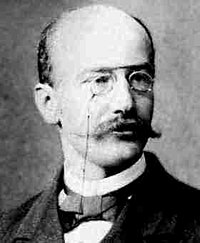Ferdinand von Lindemann
Ferdinand von Lindemann | |
|---|---|
 Carl Louis Ferdinand von Lindemann | |
| Born | April 12, 1852 Hannover, German Confederation |
| Died | March 6, 1939 (aged 86) |
| Nationality | German |
| Alma mater | Friedrich-Alexander-Universität Erlangen-Nürnberg |
| Known for | Proving π is a transcendental number |
| Scientific career | |
| Fields | Mathematician |
| Institutions | University of Munich |
| Doctoral advisor | C. Felix Klein[1] |
| Doctoral students | Emil Hilb David Hilbert Martin Kutta Alfred Loewy Hermann Minkowski Oskar Perron Arthur Rosenthal Arnold Sommerfeld |
Carl Louis Ferdinand von Lindemann (April 12, 1852 – March 6, 1939) was a German mathematician, noted for his proof, published in 1882, that π (pi) is a transcendental number, meaning it is not a root of any polynomial with rational coefficients.
Life and education[]
Lindemann was born in Hanover, the capital of the Kingdom of Hanover. His father, Ferdinand Lindemann, taught modern languages at a Gymnasium in Hanover. His mother, Emilie Crusius, was the daughter of the Gymnasium's headmaster. The family later moved to Schwerin, where young Ferdinand attended school.
He studied mathematics at Göttingen, Erlangen, and Munich. At Erlangen he received a doctorate, supervised by Felix Klein,[1] on non-Euclidean geometry. Lindemann subsequently taught in Würzburg and at the University of Freiburg. During his time in Freiburg, Lindemann devised his proof that π is a transcendental number (see Lindemann–Weierstrass theorem). After his time in Freiburg, Lindemann transferred to the University of Königsberg. While a professor in Königsberg, Lindemann acted as supervisor for the doctoral theses of the mathematicians David Hilbert, Hermann Minkowski, and Arnold Sommerfeld.
Transcendence proof[]
In 1882, Lindemann published the result for which he is best known, the transcendence of π. His methods were similar to those used nine years earlier by Charles Hermite to show that e, the base of natural logarithms, is transcendental. Before the publication of Lindemann's proof, it was known that if π was transcendental, then it would be impossible to square the circle by compass and straightedge.
In popular culture[]
In xkcd comic 866, Ferdinand von Lindemann is referenced in the alt-text, apparently having used a compass and straightedge to construct the greatest birthday party ever, to which nobody showed up.
References[]
External links[]
 Media related to Ferdinand von Lindemann at Wikimedia Commons
Media related to Ferdinand von Lindemann at Wikimedia Commons- O'Connor, John J.; Robertson, Edmund F., "Ferdinand von Lindemann", MacTutor History of Mathematics archive, University of St Andrews
- Ferdinand von Lindemann at the Mathematics Genealogy Project
- Lindemann, F. "Über die Zahl π", Mathematische Annalen 20 (1882): pp. 213–225.
- 1852 births
- 1939 deaths
- 19th-century German mathematicians
- 20th-century German mathematicians
- Squaring the circle
- Number theorists
- Scientists from Hanover
- People from the Kingdom of Hanover
- University of Göttingen alumni
- University of Erlangen-Nuremberg alumni
- Ludwig Maximilian University of Munich alumni
- University of Königsberg faculty